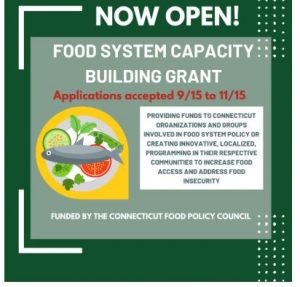The Northeast Dairy Business Innovation Center (NE-DBIC) and its partners offer grants, events, workshops, and educational opportunities to dairy farmers, processors, and service providers. Click here for more information.
All posts in News
Sept 30, 2022: CT DoAG Urges Livestock Owners to be Aware of EPIZOOTIC HEMORRHAGIC DISEASE (EHD)
LIVESTOCK OWNERS URGED TO BE AWARE OF EPIZOOTIC HEMORRHAGIC DISEASE (EHD) AFTER RECENT DETECTIONS IN
WHITE-TAILED DEER IN CONNECTICUT
The Connecticut Department of Agriculture (CT DoAg) is urging livestock owners to be aware of signs of epizootic hemorrhagic disease (EHD). This follows the recent announcement by Connecticut Department of Energy and Environmental Protection (DEEP) that EHD has been confirmed in white-tailed deer for the third year since first detected in our state in 2017. EHD is considered endemic in the United States and occurs sporadically, primarily in white-tailed deer. Because the disease is spread by biting Culicoides midges, the disease occasionally spills over to domestic livestock. Outbreaks of hemorrhagic disease are often associated with wet weather,
which provides breeding areas. Drought conditions which may concentrate animals and vectors around diminishing water sources may also be linked to some outbreaks occurring in the late summer and early fall due to an increase in midge numbers. Hemorrhagic disease outbreaks cease with the onset of a hard frost, which kills the midges carrying the virus.
For more information, click here.
Oct 2, 2022: CT Agricultural Mediation Services Available at little to no cost
The Connecticut Agricultural Mediation Program helps clients of USDA agencies and others in the Connecticut agricultural and rural communities resolve and manage disputes by providing mediation, facilitation, and training.
The Connecticut Agricultural Mediation Program (CTAMP), administered through the Quinnipiac University School of Law Center on Dispute Resolution, provides mediation and other conflict resolution services to Connecticut’s agricultural and rural community. Certified and sponsored by the United States Department of Agriculture (USDA), CTAMP’s services are available state-wide at little or no cost for USDA customers.
Mediation can provide many benefits, including helping to ensure that disagreements and disputes that threaten the economic success of farms are addressed quickly and confidentially.
TYPES OF DISPUTES WE HANDLE
CTAMP mediators can assist farmers, producers and other USDA customers to resolve the following issues:
-
Agricultural loans and loan-servicing, including Farm Service Agency and Rural Development loans
-
Adverse decisions from a USDA agency
-
Wetlands determination
-
Conservation compliance
-
Crop insurance
-
Pesticide application
-
Lease issues, including land leases and equipment leases
-
Family farm succession planning
-
National Organic Program established under the Organic Foods Production Act of 1990
-
Neighbor to neighbor disputes
-
Land use
-
Environmental concerns
-
Other issues as the Commissioner of the Connecticut Department of Agriculture considers appropriate for better serving the agricultural community and persons eligible for mediation
CTAMP provides low or no cost mediation services to the agricultural community for these issues. For other agricultural issues other funding sources may be available or we may ask parties to pay on a sliding scale.
TRAINING & WORKSHOPS
CTAMP occasionally offers training opportunities and workshops in negotiation, conflict competency, facilitation, meeting management and succession planning to the agricultural community.
Click here to learn more or download a brochure.
Sept 20, 2022: USDA Food System Capacity Building Grant Applications due Nov. 15
CONNECTICUT DEPARTMENT OF AGRICULTURE ANNOUNCES NEW
FUNDING OPPORTUNITY THROUGH FOOD POLICY COUNCIL
The Connecticut Department of Agriculture (DoAg) is pleased to announce the
competitive solicitation process to award The Food System Capacity Building
Grant provides funds to Connecticut organizations and groups involved in food
system policy or creating innovative, localized, programming in their respective
communities to increase food access and address food insecurity. Funding for
the Food System Capacity Building Grant is provided through the Connecticut
Food Policy Council under C.G.S. Sec. 22-456.
There is no minimum and the maximum amount of funds that can be requested
for one project is limited to $10,000.00. There is no match requirement for this
grant.
The application deadline is November 15, 2022, at 4:00 p.m. through the
Connecticut Department of Agriculture online application system.
Commissioner Bryan P. Hurlburt said, “During the COVID-19 pandemic, it
became clear that we needed to improve our food system, not only to make
more food available to families across the state, but to incorporate more CT
Grown products to offset the amount of food imported from out of state.
Through the efforts and commitment from the Food Policy Council, I’m happy to
announce the creation and availability of the Food System Capacity Building
Grant, which will improve the local food system and make food, particularly CT
Grown farm products, more accessible to Connecticut residents.”
Subscribe Past Issues Translate
9/30/22, 1:43 PM Climate Smart Agriculture
CT Grown for Kids Grant- Application due Nov. 15, 2022
Sept. 29, 2022: Farmer’s Cow turns farm waste into sustainable energy
Learn about New Milford’s Agricultural History
Learn about New Milford’s Agricultural History.
This video was produced by Grant Dupill and features Bill Devlin of the Trust for Historic Preservation and photos provided by Lisa Roush of the New Milford Historical Society:
Jan. 21, 2022: Solid Ground Stipend deadline
Jan. 21, 2022: Solid Ground Stipend deadline
The following opportunity is intended for new and beginning farmers with less than 10 years of experience operating their own business. These funds are intended to help new and beginning farmers purchase better tools and make upgrades to their operation instead of relying on low cost/low quality inputs. UConn Extension and its partners are eager to see these funds have a meaningful impact on farm businesses and farmer well-being.
Who is eligible:
- Connecticut farm operators that have been operating their own business for less than 10 years
- Aspiring Connecticut farm business owners that plan to launch their business in 2022 and have more than one season of farming experience on someone else’s farm
- Market gardeners in Connecticut with at least one season of experience selling their products
Stipend Purpose:
UConn Extension’s Solid Ground Program seeks to make available stipends to new and beginning farmers for the following purposes:
- Purchase of inputs such as seeds, compost, soil amendments, mulch, equipment rental, small equipment purchases, materials for integrated pest management.
- Assistance beyond the types mentioned above that are relevant to pivoting the business due to COVID-19.
To offset producer costs associated with conservation practices, land preparation, land leasing, and Wi-Fi connectivity.
Stipend Level:
Stipend requests can be $500 minimum up to $2000 maximum per farm business.
Timeline:
Applications must be received by 5:00 pm on January 21st, 2022
- UConn Extension seeks to announce awards by mid-February and no later than Feb 28, 2022.
- As soon as the recipient is an approved entity for payment, UConn Extension will initiate payment in full to the recipient. This process can take up to 4 weeks.
- Recipients should use their stipend within 12 months of receipt.
Application Submission:
- Applications can be completed by using this online APPLICATION FORM
- If an applicant is facing challenges with this application system and/or requires assistance with the online application, please contact jiff.martin@uconn.edu
Available Funds:
UConn Extension will make $60,000 in total available to new and beginning farmers in Connecticut through this stipend program.
Priorities:
- Supporting the viability of farmers/market gardeners who identify as Black, Indigenous, People of Color
- Supporting farmers/market gardeners who have had difficulty accessing capital for their business
- Potential of stipend to contribute to conservation of natural resources, climate resilience, climate adaptation, or climate mitigation strategies
- Potential of stipend to increase production and availability of CT Grown products
Ineligible Expenses:
- Land purchase
- Large equipment purchases that cost over $2000
- Payroll for employees
- Compensation for applicant’s labor
- Reimbursement for past expenditures
Source of Funding:
The Solid Ground Farmer Training Program at UConn Extension is funded by USDA-National Institute of Food and Agriculture Beginning Farmer and Rancher Development Program (BFRDP). Additional funding was made available to BFRDP awardees through the Coronavirus Response and Relief Supplemental Appropriations Act of the Consolidated Appropriations Act, 2021 (P.L. 116-260) for the purpose of assisting producers facing COVID–19 impacts to their business. This stipend program is structured as a one-time opportunity to make funds directly available to new and beginning farmers in 2022.
DAIRY FOOD SAFETY & CERTIFICATION GRANT
Dairy Food Safety and Certification Grant, due Feb. 3, 2022
The Dairy Food Safety & Certification Grant program will provide grants for dairy businesses to take actionable steps to increase production safety standards with the goal of accessing new markets. Projects that increase marketability of dairy products will be prioritized. Grant funds may be used for technical assistance, audits, food safety plan development, training, testing fees, and certain infrastructure upgrades. This application is open to dairy producers, processors, and producer associations based in the Northeast. Grants will range from $10,000 – $40,000 with a 25% cash or in-kind match requirement. Applications are due February 3, 2022. Click here for more information.
USDA ANNOUNCES $3 BILLION INVESTMENT IN AGRICULTURE, ANIMAL HEALTH, AND NUTRITION; UNVEILS NEW CLIMATE PARTNERSHIP INITIATIVE, REQUESTS PUBLIC INPUT
Sept. 29, 2021: Agriculture Secretary Tom Vilsack announced a comprehensive set of investments to address challenges facing America’s agricultural producers. These include assistance to address challenges and costs associated with drought, animal health, market disruptions for agricultural commodities, and school food supply chain issues. Secretary Vilsack also outlined and requested public comments on a new climate partnership initiative designed to create new revenue streams for producers via market opportunities for commodities produced using climate-smart practices. USDA is preparing $3 billion in investments that will support drought resilience and response, animal disease prevention, market disruption relief, and purchase of food for school nutrition programs. The support will be made available via the Commodity Credit Corporation (CCC). Specifically, funds will be used to provide: $500 million to support drought recovery and encourage the adoption of water-smart management practices. Up to $500 million to prevent the spread of African Swine Fever (ASF) via robust expansion and coordination of monitoring, surveillance, prevention, quarantine, and eradication activities through USDA’s Animal and Plant Health Inspection Service. $500 million to provide relief from agricultural market disruption, such as increased transportation challenges, availability and cost of certain materials, and other near-term obstacles related to the marketing and distribution of certain commodities, as part of Secretary Vilsack’s work as co-chair of the Biden-Harris Administration’s Supply Chain Disruptions Task Force. Up to $1.5 billion to provide assistance to help schools respond to supply chain disruptions.
Read the full release here.

